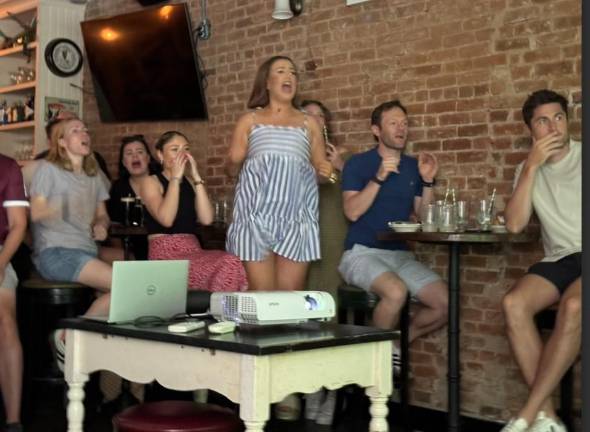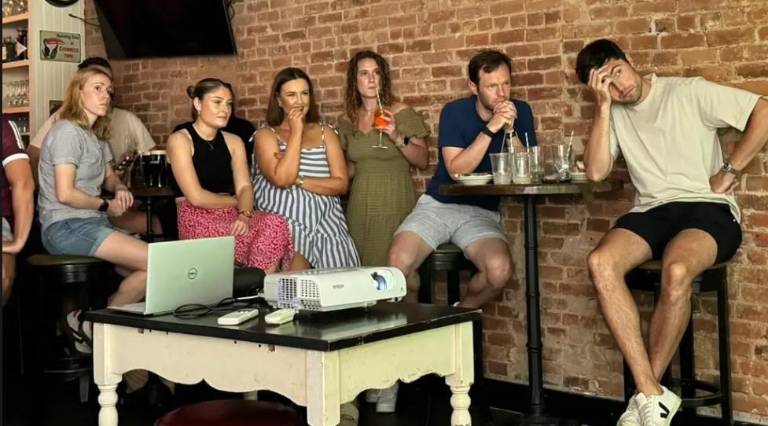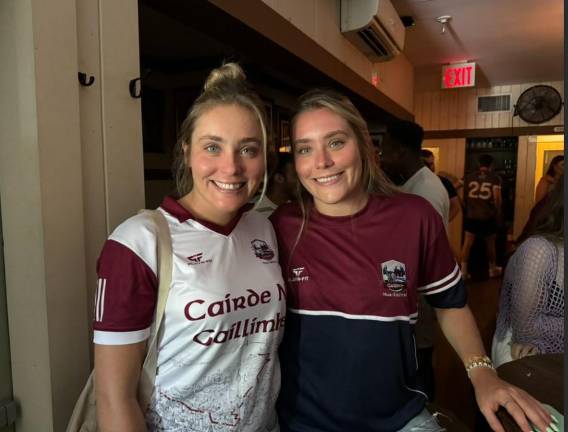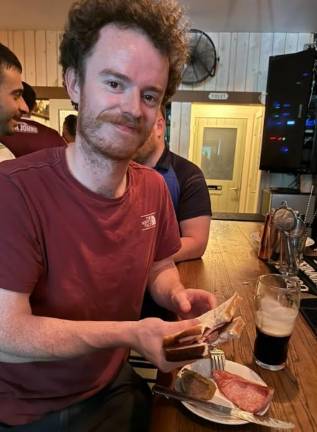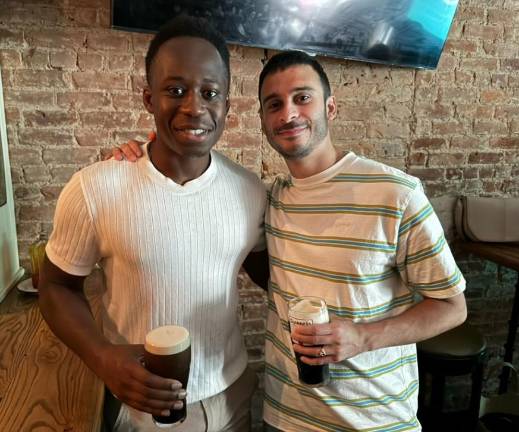Fans of Bruising Irish Football Gather in NY Pub to Watch GAA Championship from Dublin
Irish and Irish-American fans of Gaelic football packed an upstairs room at the UES restaurant The Blasket early on July 28 to watch a satellite transmission of the GAA championship final being played in Dublin that day.
It is 10:15 a.m. on Sunday morning. The rest of the city is rousing itself, but upstairs at The Blasket, things are getting loud early. The room is chock full of mostly young fans, some wide-eyed and sipping beer, others bleary-eyed and embracing the “hair of the dog” a practice of chasing a hangover after a long night by having an alcoholic beverage the next morning.
They are here, more or less, to watch the 2024 All-Ireland Gaelic Football Finals between Armagh, a county in Northern Ireland, and Galway, a county on the west coast of Ireland. Its the culmination of a round of championship games that pit teams from the 32 counties in Ireland as well as some teams from the far flung Irish diaspora from Liverpool to New York to Australia. And it all comes down to a single elimination game in packed Croke Park in Dublin. [Only once was the game ever played outside Dublin, in 1947, in the old Polo Grounds in northern Manhattan where defending champion Co. Kerry was upset by tiny Co. Cavan, which might be roughly equivalent to the New York Yankees losing to the underdog Pittsburgh Pirates in the 1960 World Series.]
The fans for the July 28 championship are mainly Irish, but there are plenty of Americans, too. Some play the sport recreationally on New York teams, some like to watch, and some are here because a significant other dragged them out of bed for the game.
The ball is just about to be thrown in. Both teams are looking to end championship droughts of more than two decades, and so the blood-maroon-colored Galway team will face off against the deep orange of Armagh.
Danny from Woodlawn is pulling for Galway since he said he did part of his degree there. He is also part of the local GAA Gaelic football team, the Manhattan Gaels, as are many people here. “It’ll be close,” he says nervously.
“Underdogs, I think,” is how Clinton from Dublin describes Armagh, which only once before had won an All Ireland. “It’d be good for a Northern team to win it.” Liam, a Bronx local, agrees. “I like to root for the Ulster teams because I feel like they’re underdogs.”
Gaelic football can be described as a cross between a very physical soccer or somewhat lighter contact sport than rugby. Players carry a round Gaelic football which resembles a soccer ball in their hands and pass it to one another, hitting it with their fists in a volleyball serve way and can kick it between each other. Every four steps, they have to bounce it off the ground or “solo” the ball by kicking it off their foot and back to themselves. No tackling is allowed, but there is plenty of shoving and grappling.
There are two ways to score: get the ball through two upright pylons (field goal poles in American football) or into the netted goal, the same as a soccer goal. Getting it through the upright is one point; getting it past the goalie and into the net is three points. So, if a final score is 20-17, that may be recorded as say 4-8 and 3-9, or 2-14 and 1-14. The three point goals are listed in the first order, and the one pointers next.
Niamh, the Chairwoman for the Manhattan Gaels, is by far the most vocal Armagh supporter despite being from Louth. “They’re my neighbors,” she yells out, referencing the border Louth shares with Armagh. She yells and cheers and curses like a sailor at points, penalties, and near-misses.
Willy from Sligo wants Galway to win since his friend, Mike, is from there. Both men are bartenders and new arrivals to New York. When asked if Galway can win it, Mike simply responds, “Yeah, definitely,” keeping his eyes glued to the game. Al from Westchester agrees with Mike. “Yeah, I think they’re gonna win...I’d say 15-16.”
The first point goes to Galway but is quickly answered by a rapid attack from Armagh. The game is brutally physical, with many penalties for shoving, tripping, and tackling. It’s neck and neck, point for point, all the way to half-time, with the score Galway 0-7, Armagh 0-6 (i.e. Galway ahead by one point, 7 to 6).
As the second half begins, the penalties pile up, and things get chippy on the field. It’s point-for-point as time begins to run out. Rob from Dublin wants Galway to win. “They beat Dublin in the quarter-final. Since they beat us, I want them to win,” he says, devouring a plate of ham, sausage, and toast. But he is worried about Armagh: “They’re taking their time to get their goals. Galway...they seem more nervous than Armagh.” He’s proven right soon enough. Armagh scores the first goal of the game, making the score 1-11, 0-11 (which tallies to 14 to 11 advantage Armagh).
Galway puts up two more points on the board but misses more than they make. Armagh holds them off, while Galway denies Armagh any more points or goals. It goes all the way down to the final seconds. The room is thick with tension, and all eyes are wide and fixed on the screen. Niamh screams and shouts for Armagh while the Galway supporters chew their fingernails. As extra time runs out, it’s all over: Armagh has held off Galway to win it, 1-11, 0-13 (14 to 13).
Jane from Galway is taking it hard. “I’m deflated,” she says, ordering a shot of whiskey. She wants to “focus on our team (Gaels) for now” since they have a game on Wednesday.
“It’s so nice to see other teams win it...I don’t want to see Dublin or Kerry win it,” says a glowing Niamh. She loves to see an underdog win. “Armagh fully deserves it!” This is their year, and she is here for it. “That’s what it’s all about!”
